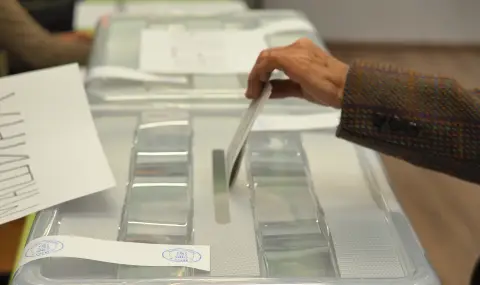Trust in elections is historically low. Bulgarians prefer machine voting. The Central Election Commission is gathering negativity against the backdrop of the election scandal. Attitudes towards the Constitutional Court are not so negative. The findings are from a nationally representative survey by the independent monthly research program "face to face" of the new agency "Measure". It was conducted with tablets between March 6 and 14. The agency "Measure" was recently established by the team of Parvan Simeonov. The research field largely coincided with the scandals surrounding the new vote count from the elections.
The belief that the elections in our country in the fall were free and fair is shared by 16.5%, compared to 63.2% who hold the opposite opinion. The rest are hesitant. The only group that sees the elections as rather free and fair, as expected, are the supporters of the winning party GERB. The data are not unexpected, but they are truly negative against the background of the overall research practice in our country.
The attitude towards the Central Election Commission is negative for 52.3% of adult Bulgarians and positive for 19.9%. The rest are hesitant. The attitude towards the Constitutional Court includes 37.2% negative attitudes, 30.2% positive and 32.6% hesitation. Thus, the attitude towards the Central Election Commission turns out to be noticeably negative. This is actually a common situation in attitudes towards Bulgarian institutions, but it is clearly visible that the CEC has a much lower approval rating than the Constitutional Court. The attitude towards the Constitutional Court is practically divided into three between “yes“, “no“ and “I don't know“ – which in the Bulgarian context is either positive evidence or a sign of relatively low familiarity.
Machines turn out to be the preferred means of voting. When given the options “paper only“, “machines only“ or “both“, adult Bulgarians answer as follows: 17.3% choose paper only, 36.9% – machines only, and 30.1% – both. Age appears to be the determining factor, not so much party preferences. The younger and economically active want the machines. Even if they are supporters of GERB or DPS-NN, for example - parties from which criticism of the machine vote is traditionally expected. Thus, the BSP and DPS-DPS (APS) remain electorates that stand out sharply from the general background - due to the higher age composition, there is also a greater desire for paper. Everywhere else, machines stand out or there are similar shares with the option “both“.
A research question of the type “if you had to choose only one of the two“ was experimentally asked. The results are as follows: 52.5% choose machines, 22.8% - paper. The rest hesitate. According to this indicator, the two formations that emerged from DPS seem to remain the only ones from the general background - with sympathizers who would more clearly choose paper. This is especially true for Ahmed Dogan's formation.
